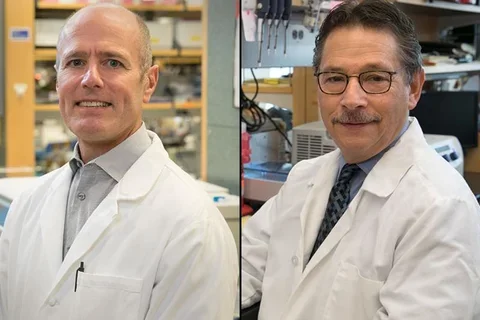UCLA scientists receive grants from California’s stem cell agency to develop therapies for white matter stroke and XLA

Two scientists at the Eli and Edythe Broad Center of Regenerative Medicine and Stem Cell Research at UCLA have received awards from the California Institute for Regenerative Medicine to develop therapies for white matter stroke and the immune system deficiency X-linked Agammaglobulinemia (XLA).
The recipients are Dr. S. Thomas Carmichael, professor and chair of neurology at the David Geffen School of Medicine at UCLA and interim director of the UCLA Broad Stem Cell Research Center and Dr. Donald Kohn, distinguished professor of microbiology, immunology and molecular genetics, pediatrics and molecular and medical pharmacology.
Both Carmichael and Kohn’s grants will support their efforts to advance therapeutic candidates towards the Food and Drug Administration’s investigational new drug application process, which is required by the agency before a phase 1 clinical trial can begin in humans.
Carmichael’s $250,000 award will fund translational studies of a stem cell therapy he is developing to promote tissue repair in white matter stroke, a progressive disease that leads to vascular dementia.
“White matter stroke is the second leading cause of dementia and is always seen with Alzheimer’s disease; each of these conditions accelerates the other,” Carmichael said. “This represents a critical unmet medical need because there’s no therapy that enhances recovery or even slows disease progression.”
White matter stroke primarily affects glial cells, a category of brain cells that support, connect and protect neurons. Carmichael’s therapy – developed with stem cell biologist Bill Lowry and neuroscientist Irene Llorente – uses a novel technique to direct induced pluripotent stem cells to quickly produce glial cells.
In preclinical studies in mice, the group has found that these cells can be injected into the damaged area of the brain where they release chemicals called growth factors that turn on the brain’s own repair mechanisms. Activating these repair processes limits the progression of damage, enhances the formation of new neural connections and stimulates the insulation of these new connections, leading to improved recovery.
“Our vision is that this would be a one-time therapy that is administered to patients with early signs of dementia or white matter stroke,” Carmichael said.
Kohn’s $250,000 award will support his efforts to develop a blood stem cell gene therapy for the genetic immune system deficiency X-linked Agammaglobulinemia, also known as XLA.
This condition affects the body’s ability to generate B cells, which are critical immune cells that produce antibodies, proteins that neutralize invading pathogens like viruses and bacteria. Patients with XLA require lifelong infusions of immunoglobulins to replace these missing antibodies, a treatment that is expensive and does not fully protect them from increased risk of infection.
XLA is caused by mutations in the Bruton’s tyrosine kinase gene, which encodes for a protein by the same name. This protein is essential for the development and maturation of B cells. One challenge to developing a gene therapy for XLA is that the BTK gene is large and contains more than 100 hotspots where disease-causing mutations can occur. To overcome this hurdle, Kohn and his collaborators immunologists Dr. Caroline Kuo and Kenneth Dorshkind utilized the CRISPR/Cas9 platform to create a one-size-fits-all stem cell gene editing approach.
Adapted from a naturally occurring immune reaction that bacteria use to fight viruses, CRISPR/Cas9 relies on a scissor-like protein called Cas9, which can be directed to cut DNA at specific sites on a cell’s genome to disable, repair or make other alterations to genes.
Kohn’s XLA therapy will involve removing patients’ blood stem cells and then using CRISPR/Cas9 to cut into the beginning of the BTK gene and insert a new, mutation-free copy. Putting a healthy version of the BTK gene right up front overrides any mutations that may follow in the old gene. It places the new healthy copy of the BTK gene under the control of the BTK gene’s own regulatory controls so that it is expressed only at the stages of B cell development where it is needed.
This new grant will support Kohn and his collaborators’ work to demonstrate that this strategy can work in mouse models of XLA to restore their ability to produce antibodies in response to vaccines. Next steps would be to show that this approach will work with XLA patient cells in a lab dish.
“The current therapy for XLA is expensive and imperfect; many patients still suffer from progressive lung infections and other problems,” Kohn said. “If this therapy is successful, our hope is that it would be a one-time, permanent cure that allows patients to live longer, healthier lives.”
Both of the therapeutic strategies described above are still the subjects of pre-clinical studies and have not been tested in humans or approved by the FDA as safe and effective for use in humans.
Original Article: "UCLA scientists receive grants from California’s stem cell agency to develop therapies for white matter stroke and XLA"



